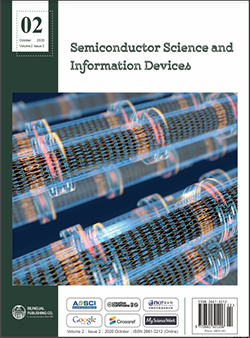Assessing the Effectiveness of Adhoc-Network and Electronic Government in Abuja, Nigeria
DOI:
https://doi.org/10.30564/ssid.v2i2.2496Abstract
E-Government is the use of information and communication Technologies (ICT) such as internet, smart phones,telecommunication, mobile company among others to interact between government and the citizens in running the affairs of the country such as decision making etc. The impact and potential of ICTs have not been fully exploited in the Nigerian context,leaving government in a weak position to formulate policy comprehensively and implement plans effectively. In addition to the implementation of e-government in some part of the Federal Capital Territory (FCT) of Nigeria Abuja, but its effectiveness is not impressive. The citizens connection to the government is limited it can be improved more easily using electronic means of communication, A reduction in corruption cases as accountability and transparency can also be increased, Equal opportunity will be given to all to access information irrespective of the person’s physical location or disability and the elimination of the bureaucracy experienced in government offices. This research work is aimed at assessing the effectiveness of e-government in federal capital territory of Nigeria Abuja using Seoul Metropolitan Government as a yard stick for measuring the effectiveness.Questionnaire was used as a primary method of data collection, internet and library as secondary data. The data obtained from the questionnaire has been analyzed using frequency table and percentage. The findings of this work shows that 41.91% of the respondents agree e-government initiatives have decreased civil servants corruption in Abuja, 46.81% of the respondents agree that E-government services has increased citizens trust in Abuja, 58.11% of the respondents believe that E-government initiative have increased the accessibility to the government in Abuja however 37.11% agree that Lack of Information Technology (IT) infrastructure is the major problem affecting E-government in Abuja.
Keywords:
E-government, Abuja, Seoul, Internet, Smart phones and telecommunicationReferences
[1] Adah, B. A. The Status and Nature of E-governance in Nigeria, University of Uyo, 2015.
[2] Andrew L., Robert D. A. Breaking Down Bureaucratic Barriers: the next phase of digital government.Progressive Policy Institute, 2001.
[3] Edward O., Charles O. New Wine in old Wine Skin:An Exploration of Major Constraints to e-Government Implementation in Nigeria. European Scientific Journal, 2014, 10 (14): 481-487.
[4] Fatile J. O. Electronic Governance: Myth or Opportunity for Nigerian Public Administration? International Journal of Academic Research in Business and Social Sciences, 2012, 2(9) [online] available online at:https://www.hrmars.com/journals [accessed 8th January,2016].
[5] Janet C. The Quest for Economic Government: A defining Version. Institute for Electronic Government,IBM cooperation, 1999.
[6] John D. E-Governance: A Weapon for the Fight against Corruption in Nigeria [online] Published by saharareport. 2013. Comavailable online from:http://saharareporters.com/2013/08/10/e-governance-weapon-fight-against-corruption-nigeria-john-danfulani-phd
[7] Kabir M. Global Best Practices in Digital Electoral Process: The Effects and Benefits of e-Electoral Process for a Developing Country (Nigeria), E-Nigeria conference 2015, Abuja 17th to 19th November 2015.
[8] Rand A. O., Emad A. A. Drivers of E-Government and E-Business in Jordan. Journal of Emerging Technologies in Web Intelligence, 2010, 2(3): 204 -211.
[9] Sharon S. D. The Evolution and Continuing Challenges of E-governance. Public Administration Review, 2008, 68(Special issues).
[10] Samuel Z. Cyber Warfare and its Relationship to Electoral Processes. E-Nigeria conference 2015,Abuja 17th to 19th November 2015.
[11] Valentina D. N. E – Government for Developing Countries: opportunities and Challenges The Electronic Journal on Information Systems in Developing Countries, 2004, 18(1): 1-24.
[12] Saidu, A. E-governance Delivery through Information and Communication Technology (ICT), 2016.
[13] Saxena, K. B. C. Towards excellence in e-governance.International Journal of Public Sector Management,2005.
[14] Heeks, R. Understanding e-governance for development, 2001.
[15] Dawes, S. S. The evolution and continuing challenges of e-governance. Public Administration Review,2008, 68: S86-S102.
[16] Palvia, S. C. J., Sharma, S. S. E-government and e-governance: definitions/domain framework and status around the world. In International Conference on E-governance, 2007, 5: 1-12).
[17] United Nation E-governance survey. Gearing E-Government To Support Transformation Towards Sustainable And Resilient Societies. 2018.
[18] United Nation. Transforming our World: the 2030 Agenda for Sustainable Development. 2015. [online] Available at:https://sustainabledevelopment.un.org/content/documents/21252030%20Agenda%20for%20Sustainable%20Development%20web.Pdf
[19] UNDESA. World Public Sector Report “Working Together: Integration, Institutions and The Sustainable Development Goals”, 2018, 5. Available at:https://publicadministration.un.org/en/Research/World-Public-Sector-Reports
[20] UNDESA. Guide on Lessons for Open Government Data Action Planning for Sustainable Development,2017. Available at:http://workspace.unpan.org/sites/Internet/Documents/UNPAN97913.pdf
Downloads
How to Cite
Issue
Article Type
License
Copyright © 2020 Ibrahim Goni, Abdulrahman Saidu, Umar Maigari T.

This is an open access article under the Creative Commons Attribution-NonCommercial 4.0 International (CC BY-NC 4.0) License.




 Aims and Scope
Aims and Scope Ibrahim Goni
Ibrahim Goni





